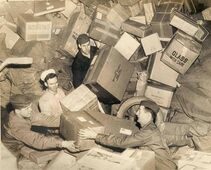|
12/2/2022 Hope: a Gift from World War II U.S. Troops sorting holiday mail 1944. Source Wikimedia U.S. Troops sorting holiday mail 1944. Source Wikimedia The Truth of Who You Are has a major part set during the Battle of the Bulge in World War II. This epic military campaign began in the foreboding Ardennes Forest December 16, 1944 and was not concluded until January 1945. The Germans had amassed a large army hidden in the forests along the ridges and deep ravines of the Ardennes mountains of eastern Belgium and France. The Germans' objective was to take the city of Bastogne and the port of Antwerp. Unsuspecting American soldiers from the 110th Infantry were recuperating from the brutal battle in the Hürtgen Forest in the town of Clervaux. And when the Germans began their offensive, the Army was taken by surprise. Although the Germans would eventually be defeated, it was an epic battle. Infantrymen recount the eerie presence of German soldiers camouflaged in white outer-coats to match the snow, moving like wraiths in and out of the cover of fir trees on the battlefield. By the time it was over, 75,000 American and 80,000 German soldiers perished in the Ardennes. While looking for primary sources I landed on a book titled: I'll Be Home for Christmas. It's a compilation of soldiers' letters and essays from the U.S. Library of Congress focused on the period of time soldiers' memories of home were most precious. The chapters include passages where they describe the movement of the infantry through the dark fir forests of the Ardennes, trudging through snow up to their thighs, hiding in fox holes, reminiscing about the holiday. More than once, the gravity of the moment was interspersed with small wonders and gestures of humanity. As one of the survivors, who was holed up in a cellar on Christmas Eve recalled: "At the stroke of midnight, without an order or request, dark figures emerged from the cellars. In the frosty gloom voices were raised in the old familiar Christmas carols. The infantry....could hear voices two hundred yards away in the dark, in German,...singing Silent Night." They decorated random trees with tin ration cans. They made the best of a situation while pining to be home. Some of the men who were separated from their units ended up in cabins of the locals who gave them refuge and food on Christmas Eve. A medic was given a wooden carving from a piece of packing crate with the word Weihnachten 1944 (Christmas in German) from one of the German prisoners of war he treated. A Belgium schoolteacher, returning to his classroom after the battle found this written on the blackboard by a German officer: May the world never live through such a Christmas night. Nothing is more horrible than meetings one's fate, far from mother, wife, and children..... Life was bequeathed us in order that we might love and be considerate to one another. From the ruins, out of blood and death shall come forth a brotherly world. One of the more poignant stories comes from bomber pilot Philip Ardery who knew all too well that fate might never give him another Christmas. He was reminded of this everyday while flying over Europe during the month of December of 1943. Growing up, he never opened any presents before Christmas Day. By late November family members of the pilots were sending packages to the headquarters where he was stationed. Many sat unopened, a 'Return to Sender' stamped on them when a soldier failed to return from a flight. Yet when Ardery was sent out on a mission in the inky dark of a bracing cold dawn, he had to decide: should I open one of my gifts just in case I don't make it back? His family and friends made sure he had plenty to open. Each night he considered them from the perch of his bunk; the packages, sitting there waiting for him to rip open and discover what was inside. Making it even more difficult was the fact that the weather was horrendous. Heavy fog and cold, damp air was hindering the pilots' efforts. Because they had not received their pathfinder equipment on time, they were flying without the instruments needed to guide the bombing. As a result, there were many mid-air collisions. In addition, lack of adequate gear meant men returned from their mission with frostbitten hands and many had to be hospitalized. As the casualties mounted, each day, Ardery asked himself: should I open my presents just in case I don't make it back alive? Indecision plagued him through the month of December. He didn't. He said the gifts were magical because of who sent them, those he held dearest. Maybe it was the taboo of opening anything before Christmas. Maybe it was hope. Hope that he would make it through his mission to eventually return home to those people he held dear. Hope may have been the greatest gift he received that year, that along with his life. He eventually opened his gifts on Christmas Day. One of the lucky ones to return home to family. Comments are closed.
|
AuthorSheila Myers is an award winning author and Professor at a small college in Upstate NY. She enjoys writing, swimming in lakes, and walking in nature. Not always in that order. Archives
April 2024
CategoriesAll Adirondacks Algonquin Appalachia Award Cades Cove Canada Chestnut Trees Christmas Civilian Conservation Corps Collis P. Huntington Creativity Doc Durant Durant Family Saga Emma Bell Miles Finger Lakes Great Depression Hell On Wheels Historical Fiction History Horace Kephart Imagination National Parks Nature Publishing Review Screenplay Short Story Smoky Mountains Snow Storm Stone Canoe Literary Magazine Thomas Durant Timber Wilderness World War II Writing |
|
|
All materials Copyright 2022
Any reproduction, reprint or publication without written consent of author prohibited. |
 RSS Feed
RSS Feed